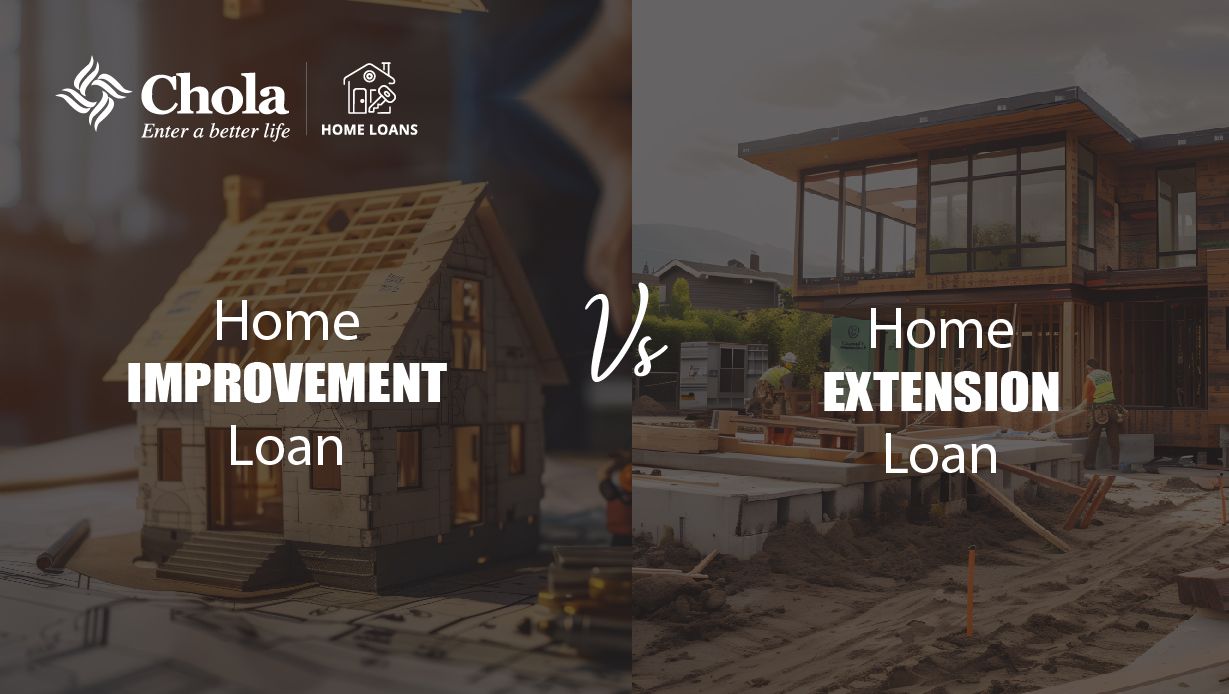Home Improvement vs. Home Extension Loan: Understanding the Differences

Introduction
When it comes to enhancing your living space, homeowners often explore various financing options such as home improvement loans and home extension loans. Both types of loans serve distinct purposes and come with specific features tailored to different needs. In this detailed guide, we'll delve into the differences between home improvement and home extension loans, helping you make informed decisions about which option best suits your requirements.
Careful planning is required when you go for a loan for your home renovation. Here's where home improvement loans and home extension loans enter the scene, offering distinct solutions for your home renovation goals.
What is a Home Improvement Loan?
A home improvement loan is specifically designed to finance renovations, repairs, and upgrades within your existing residential property. Whether you're looking to remodel your kitchen, upgrade bathrooms, replace flooring, or undertake structural repairs, a home improvement loan provides the necessary funds. These loans typically come with favourable terms and lower interest rates compared to personal loans, making them a cost-effective option for enhancing the aesthetics and functionality of your home.
A home extension loan is a secured loan option. Here, your property serves as collateral for the loan
Key Features of Home Improvement Loans
- Solely intended for renovating or improving the interior or exterior of your current home.
- Typically based on the estimated cost of renovations or improvements.
- Generally, the interest rates are lower than personal loans.
- Flexible repayment periods, often ranging from 1 to 15 years depending on the lender and loan amount.
- Interest paid on home improvement loans may qualify for tax deductions under certain conditions, as per Income Tax regulations.
What is a Home Extension Loan?
On the other hand, a home extension loan is specifically meant for expanding the existing structure of your home. Whether you want to add an extra room, extend the kitchen, build a new floor, or create additional living space, a home extension loan provides the necessary financial support. These loans cater to homeowners looking to increase their living area due to growing family needs or lifestyle changes, enhancing both space and property value.A home extension loan is a secured loan option. Here, your property serves as collateral for the loan. This allows you to borrow larger sums for significant projects that may involve expanding your living space.
Key Features of Home Improvement Loans
- Specifically for adding new construction or extending the current structure of your home
- Based on the estimated cost of the extension or new construction.
- Similar to home improvement loans, interest rates are generally lower than personal loans due to the property acting as collateral.
- Flexible repayment options, often aligned with the loan amount and borrower's financial capability.
- Like home improvement loans, interest paid on home extension loans may also qualify for tax deductions under specific conditions, as per Income Tax laws.
Differences Between Home Improvement and Home Extension Loans
- Home Improvement Loan: Used for renovating or upgrading existing structures, enhancing aesthetic appeal, functionality, and structural integrity. Home Extension Loan: Used for adding new construction or extending the current structure to create additional living space.
- Home Improvement Loan: Based on the estimated cost of renovations or repairs. Home Extension Loan: Based on the estimated cost of new construction or extension, which typically involves higher amounts due to construction costs.
- Both types of loans generally offer lower interest rates compared to personal loans, as they are secured by the property.
- Interest paid on both home improvement and home extension loans may qualify for tax deductions under certain conditions, subject to Income Tax regulations.
- Both loans require similar documentation, including property documents, income proof, identity proof, and address proof.
- To determine whether a home improvement loan or a home extension loan is more suitable for your needs, consider the following factors.
- Assess whether your primary goal is to enhance existing spaces or to add new living areas.
- Evaluate the estimated cost of renovations or extensions and compare it with your financial capabilities.
- Consider long-term goals and how the renovation or extension aligns with your lifestyle and property value.
- Home loan EMI calculators are invaluable tools that help you estimate monthly instalment payments based on various loan parameters. Here’s how you can benefit from using an EMI calculator for home loans.
- Utilize home loan EMI calculators to estimate monthly repayments based on loan amount, tenure, and interest rates.
- Determine a suitable EMI amount that fits within your monthly budget and financial goals.
- Compare EMI amounts for different loan amounts, tenures, and interest rates offered by various lenders.
- Plan your loan repayment strategy effectively to manage finances and ensure timely payments.
Conclusion
Both home improvement loans and home extension loans offer viable financing options for homeowners looking to enhance their living spaces. Understanding the differences between these loans is crucial for making informed decisions that align with your specific needs, budget, and long-term goals. Whether you're renovating existing areas to improve functionality and aesthetics or expanding your home to accommodate growing family needs, there's a suitable loan option available. Utilize resources like home loan EMI calculators to explore loan terms, estimate repayments, and streamline your financial planning process. By leveraging these tools and understanding the nuances of each loan type, you can embark on your home improvement or extension project with confidence and financial prudence.
Ultimately, the choice between a home improvement loan and a home extension loan depends on your specific needs and financial situation. Carefully assess your project requirements, weigh the pros and cons of each loan option, and choose the best option suitable to your requirements.
Disclaimer: *Terms and conditions apply. The information provided in this blog is generic and for educational purposes only. The blog does not contain any financial advice. Interest Rates and Loan Amounts are subject to change. Contact us for any exclusive information required regarding our products and services.











